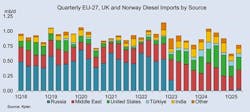2026 brings new challenges for European diesel supplies
Key Highlights
- The EU plans to ban imports of processed Russian crude products starting in 2026, affecting regional diesel supply chains.
- Middle Eastern countries, especially Saudi Arabia and Kuwait, have become major suppliers of diesel to Europe following sanctions on Russia.
- Refineries in India and Türkiye, which rely heavily on Russian crude, may face restrictions on their diesel exports to Europe after 2026.
In mid-July, the European Commission announced that the 18th round of sanctions on Russian oil trade will include an import ban on products derived from processing Russian crude beginning in early 2026. This measure follows earlier decisions to ban the direct importation of Russian crude and products, except under ongoing (albeit temporary) exemptions where logistical alternatives are not available.
These additional restrictions will complicate the sourcing of diesel imports into the region and are expected to result in further shifts in product trade flows and higher regional diesel cracks, according to an analysis from the International Energy Agency (IEA).
For the purposes of analysis, the UK and Norwegian markets are included within the trade bloc due to their regional consistency in product specifications, trade restrictions, and geographic proximity.
Over the past 2 years, diesel imports into the European Union (EU), the UK, and Norway from outside the region have averaged close to 850,000 b/d. Imports of gasoil amount to a further 150,0000–200,000 b/d but are excluded from this analysis.
“Since the imposition of sanctions on Russian crude and product exports in 2022 and 2023, respectively, Middle East Gulf countries, the US, Türkiye, and India have replaced lost Russian diesel volumes to varying degrees, with the Middle East now the largest supplier at 340,000 b/d,” IEA said.
“Trade data indicate that most of the diesel imports from the Middle East is sourced from a handful of refineries that process domestic crude, e.g. Saudi Arabia’s Yanbu, Jizan, and Jubail refineries, as well as Kuwait’s Al Zour and Mina Abdullah plants. Similarly, the US ban on importing Russian crude exempts it from heavier scrutiny.
However, Europe’s rapid increase in imports from India and Türkiye, which averaged 160,000 b/d during first-half 2025 (having reached a peak of 290,000 b/d in second-quarter 2024) may become off limits in 2026 due to the refineries’ reliance on Russian feedstocks.”
The EU’s 2022 crude import ban triggered a significant reorganization of global crude trade. Russian exports shifted toward markets largely east of Suez, while Europe compensated by increasing imports of alternative medium sour grades such as CPC and Basrah Medium and greater use of domestic grades like Johan Sverdrup. This adjustment increased the reliance of Türkiye, China, and India on Russian medium sour crude.
Consequently, diesel flows from Türkiye and India could be restricted beginning in 2026 if their refineries continue to depend on Russian crude and feedstocks.
“Indian diesel exports to Europe have almost exclusively been sourced from Reliance’s 1.2 million b/d Jamnagar complex. Since the start of 2023, Jamnagar has sourced around one-third of its crude from Russia (430,000 b/d) while 120,000 b/d, or 40%, of its diesel exports have been delivered into European markets. Similarly, three Turkish refineries that import a total of 590,000 b/d of crude have been reliant on Russian crude for roughly half of their imports over the past two years. Their combined diesel exports to European markets have been 40,000 b/d over the same period, accounting for 75% of their collective exports,” IEA said.
The sanctions package announced in July will prohibit these exports from entering the European market. Incremental diesel supplies will therefore need to be sourced from the US, the Middle East, and potentially further afield. Securing these volumes will require Europe to maintain a higher middle distillate premium to attract additional long-haul cargoes into the region.

